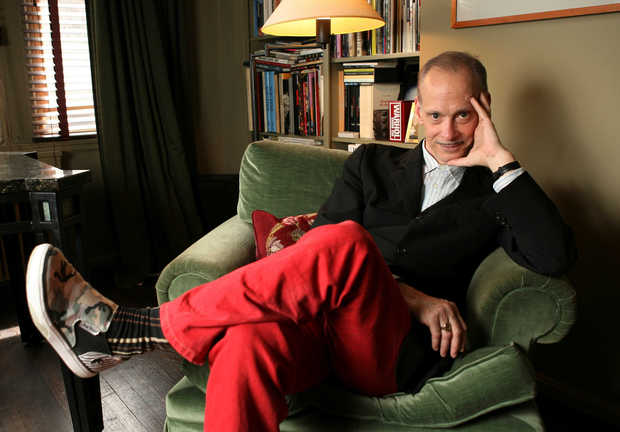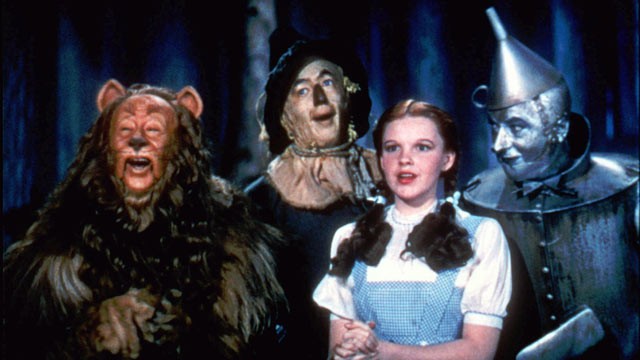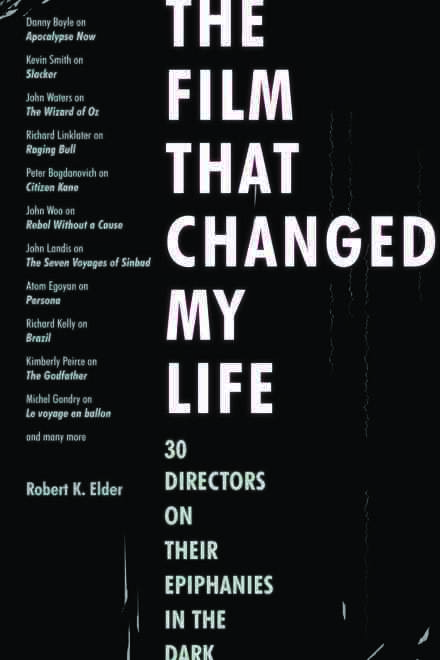CHICAGO – Patrick McDonald of HollywoodChicago.com appears on “The Morning Mess” with Dan Baker on WBGR-FM (Monroe, Wisconsin) on March 21st, 2024, reviewing the new streaming series “Manhunt” – based on the bestseller by James L. Swanson – currently streaming on Apple TV+.
Interview: Author Robert K. Elder Launches Music Box Film Series
CHICAGO – Throughout his extensive work as a film columnist, author and journalist, Robert K. Elder has been drawn to exploring both the universality and striking diversity of the human experience. In his books, Elder is intent on capturing specific moments within the lives of his subjects, while discovering their universal truths through their juxtaposition.
Elder’s latest book, “The Film That Changed My Life,” is no exception. The book compiles one-on-one interviews with thirty directors about the pivotal moviegoing experience that altered their sense of cinema (and sense of self). Filmmakers and film buffs alike will undoubtedly find the book to be a compulsive page turner. John Woo discusses his idolization of James Dean in “Rebel Without a Cause,” while Frank Oz gushes about his love of Welles in “Touch of Evil” and Atom Egoyan recalls the moment he first stumbled upon Ingmar Bergman’s “Persona.”
On June 11, Elder will launch the first installment in a potential screening series at the Music Box, featuring guest directors selected to present their own favorite films. The first film in the series is “The Wizard of Oz,” which is the film that changed the life of “Pink Flamingos” director John Waters, who memorably referred to Dorothy as a “fag hag” with a “shoe fetish” in Elder’s book. Waters will introduce the picture and then participate in a post-film Q&A with Elder. HollywoodChicago spoke with Elder about his book and his own life-long addiction to cinema.
HollywoodChicago.com: Were you always interested in writing about film, or did that passion evolve with your work as a journalist?
Robert K. Elder: They both were congruent. I had always been a film fan. I had also worked for my high school newspaper where I started writing about entertainment issues. In the introduction of my book, I talk about how “Reservoir Dogs” became the movie that changed me from a film fan into a film addict.
Author Robert K. Elder will host the first in a potential series of screenings inspired by his book The Film That Changed My Life at the Music Box on June 11.
Photo credit: Independent Publishers Group
HollywoodChicago.com: Since you ask all of the filmmakers this question in your book, I must ask you: how many times have you seen the film that changed your life?
Elder: I’ve seen it a couple times a year ever since 1992.
HollywoodChicago.com: What are your thoughts on Tarantino’s recent work?
Elder: I’m one of those people who were so taken with “Kill Bill,” especially the first volume, and then “Inglourious Basterds,” which was such a gutsy film within his mash-up nature. I don’t want to give the ending away for someone who hasn’t seen it because the thing that pissed me off in reviews was the fact that they kept tipping it off. I was hook, line and sinker on that film.
HollywoodChicago.com: How did you go about choosing the directors to interview for this book?
Elder: It had to be people I admired. I had this idea more than ten years ago when I was an intern at the dearly departed Premiere Magazine. I’m an enthusiast and scholar of epiphany moments. My book before this was “Last Words of the Executed,” which is just as cheerful as it sounds, and then I have these two websites: ItWasOverWhen.com and ItWasLoveWhen.com, which are both about life-changing moments. For all my life, I have been fascinated with what makes a human life pivot and take another direction. So this book is at the crux of two fascinations for me: film and epiphany moments.
HollywoodChicago.com: What has attracted you to assembling a gallery of diverse voices in your books? Studs Terkel seems to have been an influence on your work.
Elder: You’re right to point that out. Studs was a friend and a mentor. He wrote the introduction for “Last Words of the Executed.” But I just think we as human beings are inherently fascinated by other people telling their own story in their own words. If you’re a film fan, you’ve seen a ton of movie interviews, and it’s the same ten questions. So what I love to do is talk with directors who are tired of the same ten questions and engage them in a way about film that makes them relive it in a youthful way. They attach to that first love and they get a chance to talk about anything other than their own films. By the time directors get off a movie tour, the last thing they ever want to f—ing talk about is their own films.
HollywoodChicago.com: I’m sure Frank Oz was relieved to do an interview in which the name “Yoda” wasn’t mentioned.
Elder: Or Miss Piggy or Cookie Monster…

John Waters will discuss how The Wizard of Oz changed his life at the Music Box on June 11.
Photo credit: AP
HollywoodChicago.com: Which of the director’s choices did you find the most surprising? Were there any fights over claiming a particular title?
Elder: The only fighting was over “8 1/2” and “Raising Arizona.” It was a true generational split. With everyone else, there was no overlap. A couple people did catch me off guard, such as George Romero talking about “The Tales of Hoffmann,” which is essentially an opera. There’s a “clockwork girl” in “Tales of Hoffmann” who’s ripped apart in a ballet that looks exactly like “Dawn of the Dead,” where the guy is basically ripped into pieces. So that was surprising.
There was also Michel Gondry talking about “Stowaway in the Sky.” It was surprising, but I was so happy because that’s not a film I had known about. I knew [director] Albert Lamorisse’s films, especially “The Red Balloon.” Michel not only talked about his connections to the film but also the way that he experienced it. He wanted to recapture a sense of that film is his work by creating a dreamlike reality. That is great because I am such a fan of his work. He also ended up talking about his own mortality. Lamorisse died in a helicopter accident in Iran, and I said, ‘He died doing what he loved and he died on set. Would you ever want to die onset?’ It led to this really interesting conversation of how he would want to die.
HollywoodChicago.com: What is the best way to go about preparing for an interview with a filmmaker? Do you have questions prepared, or are you loose and spontaneous?
Elder: Oh no, I think loose and spontaneous is lazy, to be honest. I’ve researched the ten questions that they’re always asked, and not only do I find out what those questions are, I always find out what his or her answers are, and that helps me choose my tactic. It’s good to have an angle going in, so I research the s—t out of that subject. For this book, I saw each of those films three or four times. I’d watch it cold, I’d watch it with the commentary track on, I’d read biographies of the people who were in the films, I’d do a clip search of early reviews. So I really made it my mission to know as much about that film as the director who was kind enough to give me his or her time.
It’s just about making them engaged and making them interested. It’s proving that you value their time so you do the work. I remember interviewing a directing team [Scott McGehee and David Siegel] whose work I liked, particularly their first film, “Suture,” which is a really weird film. So I did my due diligence and after they got done with the interview, they were like, “That was really good. It’s flattering that you know so much about our work.” And I said, ‘It took you guys five years to make this film. The least I could do is take an evening preparing for it.’ That has been my approach and it’s worked.

Bert Lahr, Ray Bolger, Judy Garland and Jack Haley star in Victor Fleming’s 1939 classic The Wizard of Oz.
Photo credit: MGM
HollywoodChicago.com: What interview in this book would you consider the most rewarding?
Elder: It’s like choosing your children, so it’s a little hard. The fact that the book exists and came out is the most rewarding thing because it took so long to do. It took about six or seven years to collaborate with that many directors and get their schedules in line. It’s sort of like trying to herd cats. It’s kind of an impossible thing. So just the feat itself I’m proud of. But I really enjoy the passionate interviews; Danny Boyle talking about “Apocalypse Now,” Edgar Wright talking about “An American Werewolf in London,” and having Kimberly Pierce make parallels between “The Godfather” and “Boys Don’t Cry” that I had never seen before and that made me understand her in a deeper way. And of course, John Waters’ interview about “The Wizard of Oz” is basically stand-up comedy. It’s a light interview and he’s very funny. I really, really enjoyed that one. He was insightful, personable and very generous.
HollywoodChicago.com: What are your personal thoughts on “The Wizard of Oz,” and why do you think it’s remained so relevant in American culture?
Elder: Number one, it’s just a great film across the board. The performances [are great], the music holds up really well, but I also think it’s slightly off-kilter. It’s a children’s film that’s dangerous in many, many ways. My mother is still creeped out by the flying monkeys. She saw it when she was a little girl and it made her cry. I also think it’s a quintessentially American film because it’s about challenging authority. The underlying theme of the film is, ‘Don’t trust the people in power,’ and again, it’s under the guise of a children’s movie. So it has these wonderful, resonant themes that I think are uniquely American.
HollywoodChicago.com: As regional editor of Patch.com in Chicago, how do you feel the Internet has contributed to one’s understanding of pop culture, and how would you recommend navigating through the overwhelming expanse of cyberspace?
Elder: It’s the niche—you go and find what’s interesting to you and what’s relevant to you. I love stuff like Twitch Film—super-geeky, super-inside news fan sites, but there are people who are like, “I don’t care about ‘Japanaction’ or Park Chan-wook.” What’s one person’s trash is another man’s treasure. In terms of understanding pop culture, I just think any conversation is valuable. Any new source, any new forum for conversation just makes a better global community. I remember in the 1980s, the MTV motto used to be, “Too much is not enough,” and now that actually means something. [laughs] U2 adopted it for the song, “Numb,” and that was fifteen years ago. Now it’s “too much is not enough” at infinity. I just love the unlimited potential of it.

Robert K. Elder’s book The Film That Changed My Life was released on January 1, 2011.
Photo credit: Chicago Review Press
HollywoodChicago.com: What advice would you have for aspiring film writers?
Elder: The good thing is the cream rises to the top. If they’re not interesting, they sort of float away. It’s more easily disposable. You have to have a really unique voice and unique point of view, but what I think people often forget is that it’s not a godd—n term paper. You have to be entertaining to read, which is one of the reasons why I love Michael Phillips, the Tribune’s movie critic. He’s very playful and even if it’s a really bad movie, it’s a really good review because he has so much fun with language. It’s really insightful even if you don’t agree with him. I feel the same way about Scott Tobias and Nathan Rabin at The Onion AV Club. I might disagree with them wholesale, but they still write really, really great pieces. Even though Nathan Rabin’s book, “My Year of Flops,” is out the same year as my own, his is my favorite book this year. [laughs] Even if it’s a bad film, you have to be entertaining, smart, thoughtful and not dismissive.
HollywoodChicago.com: In the introduction of your book, you say that you’ve “learned as much about these directors by their choice of films” as you did from their own work. Any particular examples?
Elder: Sometimes it’s just the journey of their film, where they came from and where they ended up. George Romero has high culture aspirations. He’s an opera fan and he’s been wanting to make political films. He wanted to make a film about the Dirty War in Argentina for years, but he’s been boxed in as a zombie director. But if you look back at his career, he’s made amazingly diverse films. His first film work was making industrials and shorts for “Mr. Rogers’ Neighborhood.” I just love getting that larger view because people will surprise you all the time. Taking somebody out of a soundbite and allowing them to tell their own story is so much more interesting to me as a writer.
HollywoodChicago.com: Any film you’ve recently discovered that you care to recommend?
Elder: I have three-year-old twins, so it’s tough for me to see anything because of my day job with AOL and the kids. My wife and I recently enjoyed the hell out of an Arthur Hiller film called “The Americanization of Emily.” It’s just wonderfully dark and it’s a Paddy Chayefsky script. If any of your readers have not seen the film, run—don’t walk—to the nearest video store or Netflix. It is so good and it’s post-“Mary Poppins” Julie Andrews with James Garner and James Coburn. It’s just so biting and acidic and true.
 | By MATT FAGERHOLM |



My wife and I and my
My wife and I and my children love the movie ‘Wizard of Oz,’ starring Judy Garland, Ray Bolger, Jack Haley, Bert Lahr, Margaret ,And we see several times